Most adult churchgoers in the United States don’t frequently switch churches. But if they make a congregational change, it’s likely they made a residential change first. And those who switch have high expectations for their new congregation.
Data from a recent Lifeway Research study of American Protestant adults who attend church at least twice a month and have attended more than one church as an adult provide pastors and church leaders with insights into the ins and outs of who’s going in or out of their church doors.
During the screening process, researchers found nearly half (47%) of Protestant churchgoers who attend church at least twice a month have only attended one church as adults. Among those who have regularly attended multiple churches, more than 4 in 5 (85%) have regularly attended fewer than six. Specifically, 63% have regularly attended two or three churches, and 22% have attended four or five.
Overall, church changes often follow a residential move. Three in 5 (60%) churchgoers who’ve switched churches say they decided to attend their current church due to a residential move.
“Many churchgoers have or will change churches either because they want to or because they have to after moving to a new home,” said Scott McConnell, executive director of Lifeway Research. “It is helpful for church leaders to see how those looking for a new church conduct their search and the large number of things they feel are important in their new church.”
Your tax-deductible gift helps our journalists report the truth and hold Christian leaders and organizations accountable. Give a gift of $30 or more to The Roys Report this month, and you will receive a copy of “Baptistland: A Memoir of Abuse, Betrayal, and Transformation” by Christa Brown. To donate, click here.
Many churchgoers who have switched churches as adults are still settling into their current churches, with half saying they began attending their current church five years ago or less (50%). Around 1 in 3 (34%) churchgoers who have switched churches have attended their current church for one to five years. And 16% have attended their current church for less than a year.
Navigating transition
Whether impacted by a residential move or not, 41% of those who have switched churches say they stopped attending church for more than three months between churches, up from 28% who said the same in 2006. Nearly half of churchgoers said they began actively searching for a new church after leaving their previous one (48%), and 21% said they do not recall actively searching for a church. But some began the search for a new church before leaving their previous one (31%).
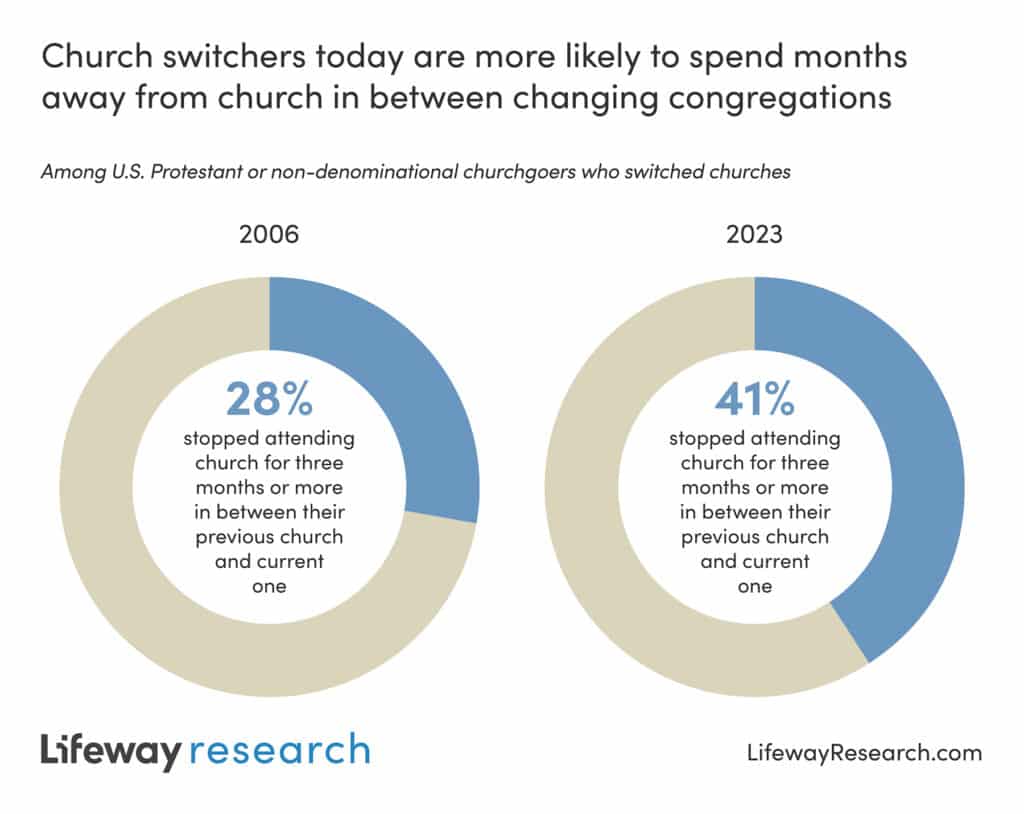
With a variety of resources available to churchgoers looking for a new church, fewer church switchers today than in 2006 rely on in-person visits to churches (69% v. 83%), recommendations from family, friends, neighbors or colleagues (56% v. 64%) or a phonebook or local advertisements (10% v. 19%). And they are more likely today to rely on church websites (37%), social media sites (29%) or online search tools (27%) than they were in 2006 to rely on “Internet websites/online search tools” (21%).
Both those changing churches locally and those making residential moves rely heavily on in-person visits (71% v. 69%). Meanwhile, movers are more likely to use online resources including church websites (40% v. 31%), social media sites (32% v. 24%) and online search tools (30% v. 21%).
“Shopping for a new church is more of a hybrid search today, with most of those who are switching churches relying on both personal visits and referrals as well as electronic information and discussions,” McConnell said.
Introductions to current church
Around 3 in 10 churchgoers who have changed congregations were first introduced to their current church because a friend or acquaintance invited them to attend (31%), they heard about it through word of mouth (29%) or a family member invited them to attend (27%). Others had always been familiar with the church (25%) or had driven by it before (23%). Fewer were first introduced to their church by finding the church website (15%), finding out about it on the internet (15%), seeing it on social media (10%), asking for recommendations online (8%), finding out about it from an ad (7%) or finding out about it through a media story (6%).
Church switchers who have made a residential move are more likely than those who have not to have been first introduced to their current church online—through the church website (20% v. 8%), the internet (19% v. 9%), social media (12% v. 6%) or online recommendations (11% v. 5%).
Among those who were first introduced to their church through the church’s website, more than 2 in 3 (67%) said the church’s beliefs and mission were the most helpful thing on the website. Churchgoers also found simple and practical information such as church location (66%) and worship times (64%) to be helpful. Others found ministries or events (50%), sermons (42%), contact information (39%), staff profiles (33%) and social media contacts (26%) to be helpful.
First visit back to church
By far, when churchgoers are visiting a new church, the first event or activity they will likely attend is a worship service (68%). However, this is down from 2006 when nearly 9 in 10 (88%) said a worship service was the first thing they attended at their current church. Church switchers who are not making residential moves are more likely than those who are to attend a worship service first (73% v. 64%).
Fewer than 1 in 10 say the first event or activity they attended at their current church was a Bible study class or small group at the church (6%), a social get-together among church members (6%), a streamed worship service (5%), a Bible study class or small group in a home (4%), a class other than a Bible study that interested them (4%), a service ministry of the church (4%) or a musical event (2%).
Among the small sample who attended a streamed service first, 54% said they streamed worship services four or more times before visiting in person, with 15% saying they watched a streamed service four or five times and 39% saying they watched a service more than five times.
“A church’s worship service is still the front door of the typical church, but a third of first-time visitors will use a different door today,” McConnell said. “It is important that every ministry within a church realizes they may have the first contact with someone who needs a church.”
For more church switchers today than in 2006, it only takes a few visits to decide that’s the church they will attend regularly. Today, more than 7 in 10 (71%) decide to regularly attend their current church after visiting worship services three times or less. Half of churchgoers who changed churches (50%) said it took them two or three visits to decide, compared to 38% in 2006. And 20% say it took one visit, compared to 16% in 2006.
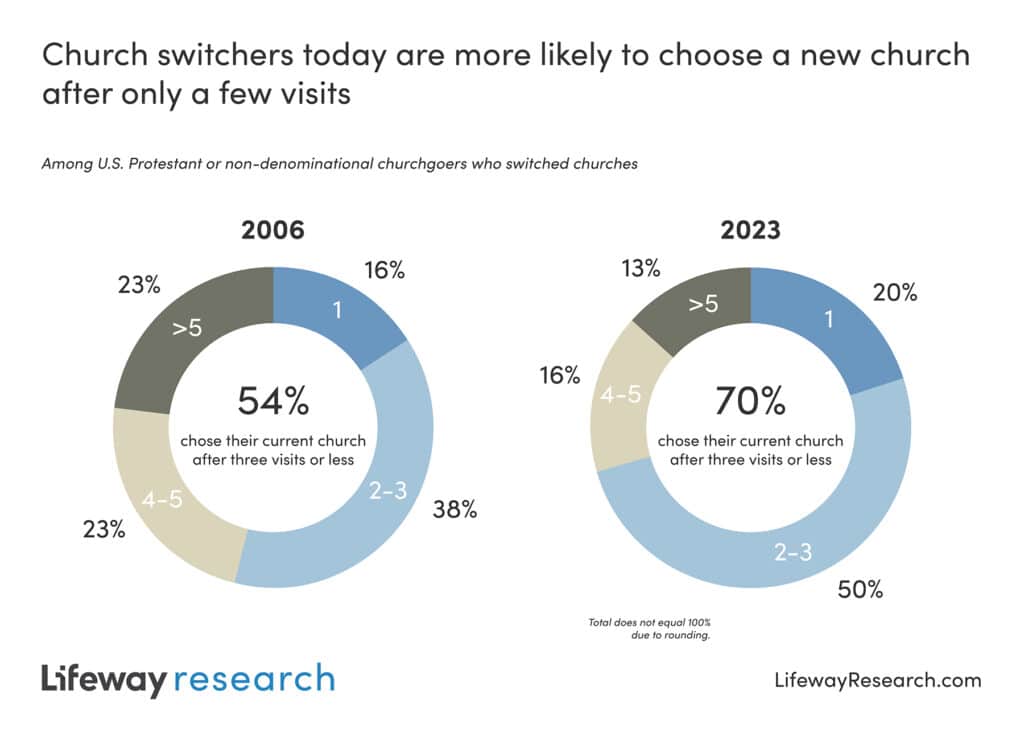
Welcomed or not
When visiting their current church, most church switchers say they were personally welcomed by congregants before or after the service (56%). Close to half say they were personally welcomed by pastors or ministers before or after the service (48%). More than a third were asked to fill out an information card by hand (36%). Fewer were invited to attend social events outside of service (23%), formally recognized during the service (19%), asked to fill out an information card electronically (12%), encouraged to introduce themselves (10%) or asked to text the church (6%). And 3% of churchgoers said they were not welcomed in any of these ways.
Church switchers today are less likely than those in 2006 to say they were personally welcomed by congregants (56% v. 67%), asked to fill out a card by hand (36% v. 62%) or contacted by a welcoming team (21% v. 28%). Switchers in 2006 were not asked about the option to provide information electronically or by text.
Nearly 4 in 5 (79%) of those who have switched churches agree that how the church welcomed visitors positively impacted their decisions to attend regularly, with 49% strongly agreeing and 30% somewhat agreeing. More than 3 in 4 churchgoers who experienced each of the welcoming approaches said it positively impacted their decision to attend regularly.
“Personally welcoming visitors, inviting them to social events and contacting them after the worship service all coincide with better impressions of a church’s welcoming approach than churches that did not do these things,” McConnell said. “You can’t take a week off when it comes to genuinely welcoming newcomers.”
Important factors
For most regular churchgoers who have changed churches, their current church’s beliefs and doctrines (86%) and preaching (86%) were important in their decision to attend that church, with 56% saying its beliefs and doctrines were extremely important and 50% saying the preaching was extremely important.
Although fewer identify these factors as extremely important, at least 4 in 5 churchgoers say factors including the authenticity of church members and pastor (84%), care for community (82%), unity among members (82%) and worship style (80%) are important or extremely important factors.
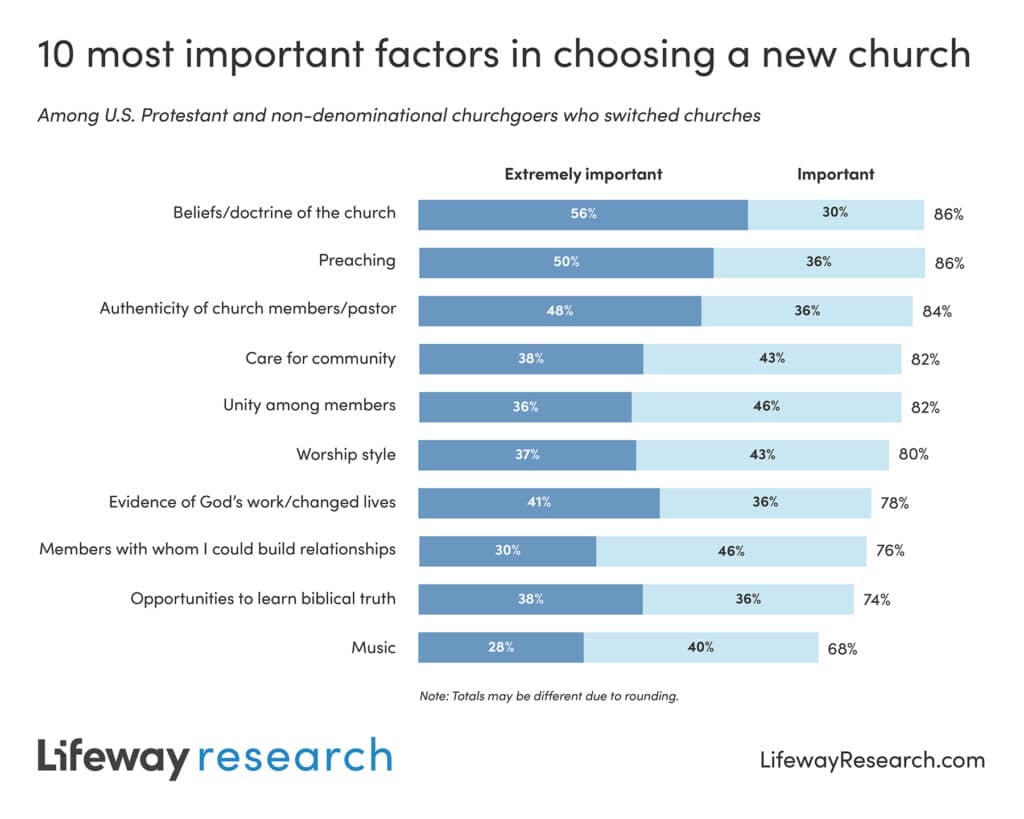
Many also say the evidence of God’s work and changed lives (78%), building relationships with members (76%), learning biblical truth (74%), music (68%), worship times (68%), location (67%), denomination (64%), opportunities to serve (62%), low pressure to commit (61%), acquaintances among church members (61%) and church members similar to them (59%) were at least important factors in their decision to attend their current church.
Other factors were less important for churchgoers looking for a new church. Less than half (49%) said age-appropriate children’s programs were important or extremely important, and 27% said it was neither important nor unimportant. Many were also neutral (34%) about the importance of the church’s size, while 40% said it was important or extremely important. More than 2 in 5 (42%) churchgoers said little use of religious jargon was neither important nor unimportant to them, and 37% said it was important or extremely important.
Those whose church switch accompanied a residential move were more likely than those whose did not to say location (70% v. 62%), denomination (67% v. 60%) and church members similar to them (62% v. 53%) were important or extremely important factors in choosing their current church.
Marissa Postell Sullivan is the managing editor for Lifeway Research.




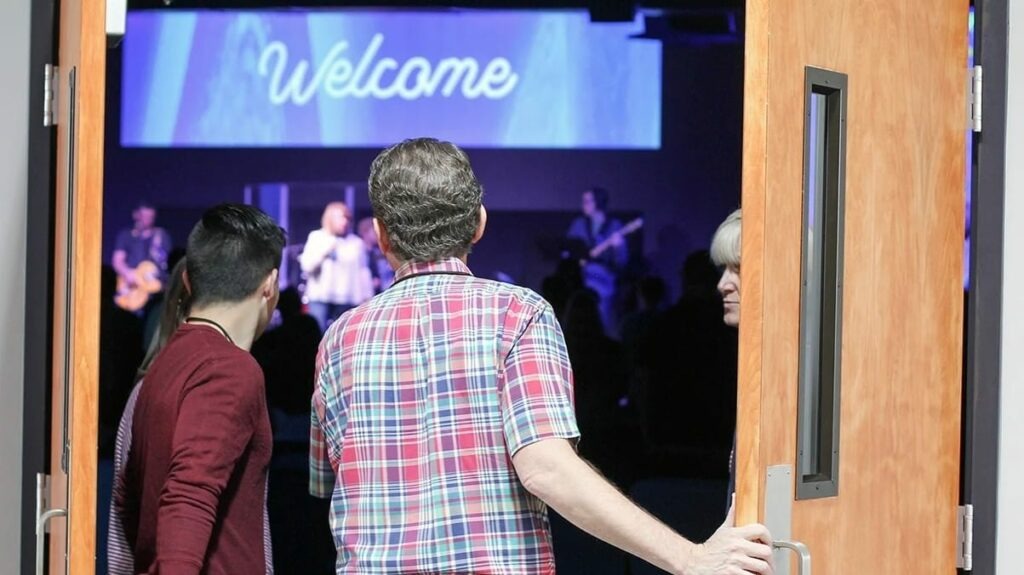

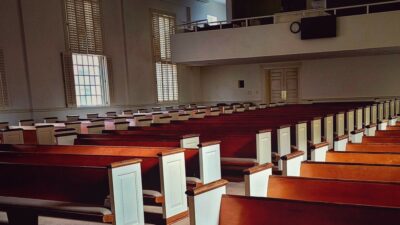

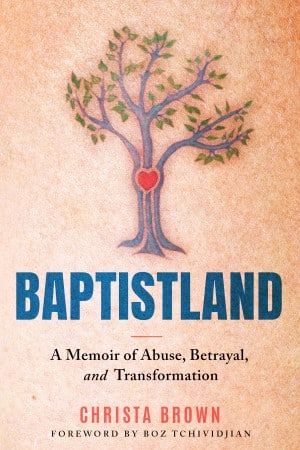



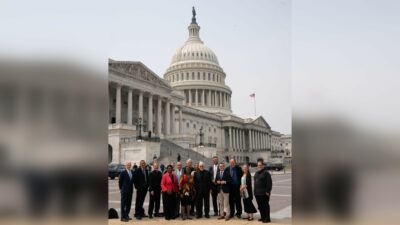








5 Responses
The headline of this article seems a bit misleading. The body of the article discusses people switching churches, however the headline implies that those surveyed had left the church for a period and time and have since returned.
A survey actually covering the headline topic of why people left church and why they have or have not returned to the same or a different church might be an interesting topic for the survey takers to explore.
Pastors and Church Elders are probably who this research is meant to be for but it is quite interesting for all people.
The first observation I would make is that you make a big mistake when you change your church to suit what people want ( Remember in the end they wont put up with sound doctrine but will hire for themselves teachers who will say only what they want to hear- 2Tim4v3… bending to follow the consumer vote is an invitation to Satan to reduce your church to a social club without the Gospel if you are not extremely careful)
Of equal interest is the dominance of the Worship service experience in peoples decision making about joining… that likewise is a bit of a worry given God has made his view on Mega Church extravaganzas and rock concert like Church pretty obvious in the last year ( he hates it) …. I do wish more people understood that without sound doctrine, without the actual Biblical truth.. everything else becomes futile. 2 The 2 is clear.. they perish for lack of loving the truth not for lack of singing or having a good time together which any Pagan get together can duplicate actually.
Anyway.. its interesting if indeed a bit disturbing as far as trend goes… Shalom
Warwick – I struggle with how to separate the megachurch phenomenon from smaller, non-mega churches. I understand that there are many smaller congregations that meet in smaller buildings. However, when each week you are singing songs produced by the megachurches, use study material in your Sunday school classes and small groups that’s written (or perhaps ghost-written) by megachurch pastors, and your congregation spends the week listening to either CCM on K-Love or sermons on the radio delivered by megachurch pastors, is your small congregation really any different than the group of people actually physically attending the megachurch building each Sunday?
I know that there a lots of problems with Mega churches and their often rock concert style of worship. I don’t know if you can definitely state that God hates them. Instead, I believe that God hates corruption and the mistreatment of his children. And that can happen in any size church.
I suspect it is because most so-called Christians like to have a feather caressing their ears while they enjoy the stadium seating and entertainment…